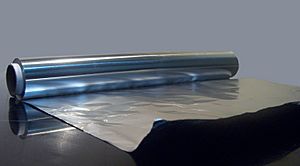Aluminium foil facts for kids
Aluminium foil is foil made of aluminium. It is less than 0.2 mm (7.9 mils) thick. It can easily be bent or wrapped around objects. Aluminium foil was replaced tin foil in the mid 20th century.
Approximately 75% of aluminium foil is used for packaging of foods, cosmetics, and chemical products. 25% is used for industrial uses. It can easily be recycled.
Contents
History
Aluminium foil replaced tinfoil in 1910, when the first aluminium foil rolling factory, "Dr. Lauber, Neher & Cie." was opened in Schaffhausen, Switzerland. The factory was owned by J.G. Neher & Sons. The factory started in 1886 in Schaffhausen, Switzerland. The way that aluminium foil was made started to change to include the use of print, colour, lacquer, lamination and the embossing of the aluminium.
Properties
Aluminium foils thicker than 25 μm (1 mil) do not allow oxygen and water to pass through.
Aluminium foil has a shiny side and a dull side. The foil may have a non-stick coating on only one side. The reflectivity of bright aluminium foil is 88% while dull embossed foil is about 80%.
Uses
Aluminium is used for packaging. Aluminium foil containers and trays are used to bake pies. It is also used pack takeaway meals. Aluminium foil is widely used in radiation shields and heat exchangers. Aluminium foil is used for art, decoration, and crafts.
Images for kids
-
A roll of aluminium foil, with micrometer showing a thickness of 13 μm (0.5 mils)
-
Microscopic close-up of aluminium foil on the back of an intumescent rubber strip.
See also
 In Spanish: Papel aluminio para niños
In Spanish: Papel aluminio para niños





